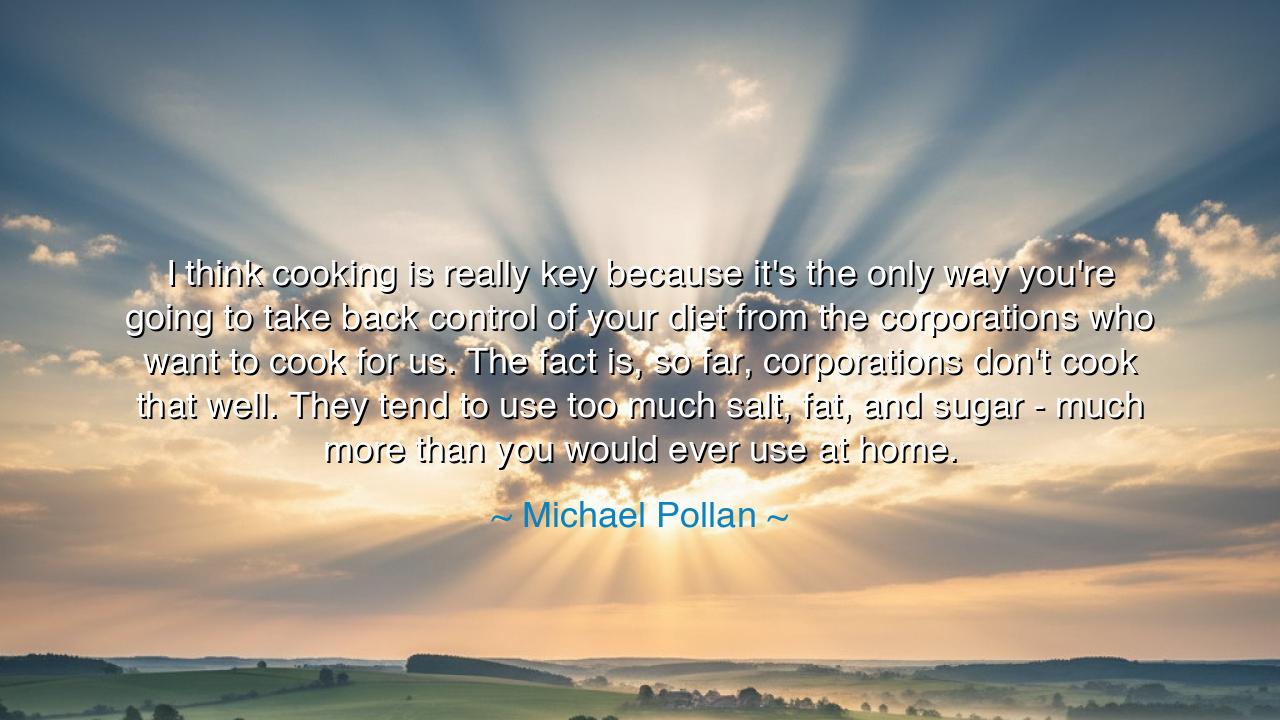
I think cooking is really key because it's the only way you're
I think cooking is really key because it's the only way you're going to take back control of your diet from the corporations who want to cook for us. The fact is, so far, corporations don't cook that well. They tend to use too much salt, fat, and sugar - much more than you would ever use at home.






When Michael Pollan declared, “I think cooking is really key because it's the only way you're going to take back control of your diet from the corporations who want to cook for us. The fact is, so far, corporations don't cook that well. They tend to use too much salt, fat, and sugar — much more than you would ever use at home,” he spoke not merely of food, but of freedom. His words resound like the counsel of an ancient sage reminding his people that true power lies not in consumption, but in creation. Beneath the surface of this simple truth lies a warning — that when we surrender the art of cooking, we surrender sovereignty over our own well-being.
In the ancient world, the hearth was sacred. It was the heart of the home, the place where fire transformed nature into nourishment. To cook was not a chore, but a ritual — a dance between human hands and the gifts of the earth. Families gathered around the flame as if before a temple, giving thanks to the gods for sustenance. The Romans honored Vesta, goddess of the hearth, for they knew that in tending the fire, they tended civilization itself. Michael Pollan’s warning is the modern echo of that ancient reverence. For when the flame of the home kitchen fades, when the corporations begin to “cook” for us, we lose not only control of our diet, but our connection to the sacred rhythm of life itself.
Pollan names the trespass plainly: salt, fat, and sugar — the false trinity of the modern appetite. These are the tools by which profit disguises itself as pleasure. The merchants of convenience feed the masses not with care, but with cunning, seducing the senses while starving the soul. And so humanity grows both overfed and undernourished, filled with calories but emptied of vitality. The ancients would have seen this as imbalance, as hubris — the arrogance of tampering with the natural order. To reclaim the act of cooking is to restore harmony, to return to the truth that nourishment should heal, not harm.
Consider the tale of Prometheus, the Titan who stole fire from the gods and gave it to humankind. With that flame, man learned to cook, to forge, to create — to rise above mere instinct. But with that gift came responsibility. Fire, when tended with wisdom, sustains life; when neglected or abused, it consumes. In our age, we have allowed others — faceless corporations — to wield our fire for us, shaping our sustenance with chemicals and greed. Pollan calls upon us to seize that flame again, to take back control of the very thing that defines civilization: the power to prepare our own food with intention and love.
There is a deeper symbolism in his words — a call to awaken from passivity. When we allow others to feed us without thought, we also allow them to shape our desires, our habits, even our health. The meal becomes a mirror of society: the hurried, the processed, the disposable. But when we cook, when we slice and stir and season with care, we slow down enough to listen — to our bodies, to the earth, to the quiet rhythm of patience. The kitchen becomes once again a place of mindfulness, where ingredients are not commodities, but blessings.
The story of every great civilization has begun with the mastery of food — and their decline often followed when they forgot it. The historian Pliny the Elder once lamented that Rome’s people had grown soft, addicted to imported luxuries and feasts of excess. What had been the strength of farmers and cooks became the weakness of consumers and gluttons. In this, we find a warning for our own age. The empire of industry feeds us much, but poorly; it fills our shelves but empties our spirit. To cook for oneself is not only to nourish the body — it is to resist the slow decay of dependency.
Let this, then, be the lesson: to reclaim the simple, noble art of cooking is to reclaim freedom itself. Take the time to prepare your food. Learn the story of what you eat — where it grows, who tends it, what it means. Replace the corporate meal with your own creation. Let the scents of herbs and the crackle of oil remind you that life, like food, is most beautiful when crafted by hand.
For in stirring the pot, you stir the soul. In breaking bread made by your own effort, you taste not just flavor, but truth. And as Michael Pollan teaches, when you cook for yourself, you do more than feed your hunger — you defy the forces that would make you forget what it means to be fully, consciously human.






AAdministratorAdministrator
Welcome, honored guests. Please leave a comment, we will respond soon